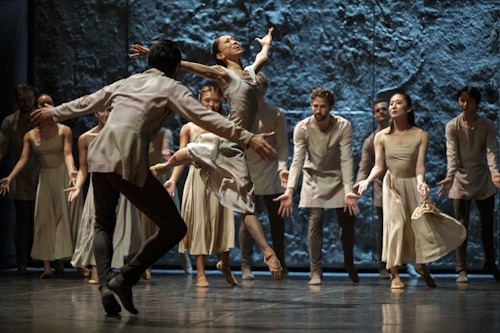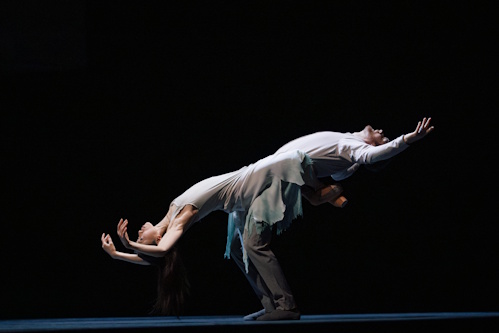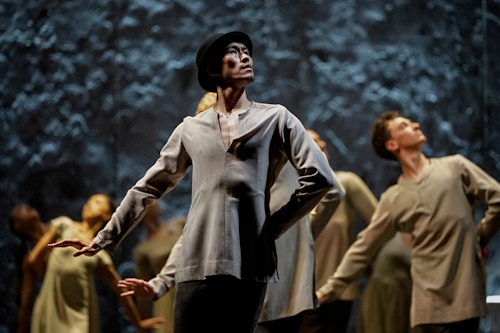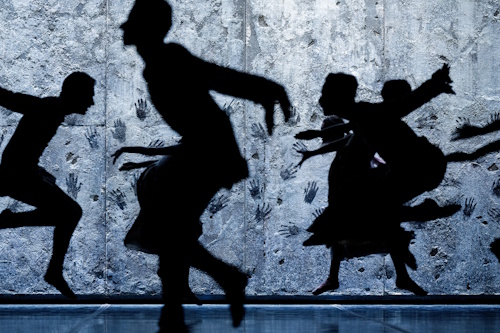National Theater, Taipei
May 8, 2025
Erina Takahashi may be retiring from full-time dancing at the end of English National Ballet’s present tour of Taiwan, but she remains a dancer and actor par excellence. There were superb performances all round on this opening night in Taipei, but it was very much her evening.
It’s fast approaching its tenth anniversary, but Akram Khan’s Giselle feels as fresh as when it was first seen. A modern classic if ever there was one. It mesmerised the National Theater audience.
Khan’s scenario gives the story added depth. The themes of love, betrayal, revenge and forgiveness found in traditional productions are all there, but there’s no ethereal airiness. Rather, he presents a dark and foreboding place populated by Landlords (the ‘haves’) and Outcasts (the ‘have nots’), one where individuals have little say in their own lives or future. It’s real world and topical, with modern society’s class differences, social inequality and injustice laid bare for all the see.
It is a monumental production but one that also speaks to the heart, no more so than in the quite sublime, tear-jerking Act II pas de deux for Giselle and Albrecht. It really is a thing of remarkable beauty. Takahashi and James Streeter may be living and dead, but every moment felt so real. It’s not remotely showy. There are no big lifts, no big jumps, but what Khan does magnificently is let the emotion-laden scene unfold naturally. It’s full of little references to what went before. Very, very moving, it’s a classic example of ‘less is more’; and in this case, a lot more.
Recently shortlisted for the 2024 National Dance Awards for her performances in the role, Takahashi’s Giselle is a strong-willed woman. When Bathilde deliberately drops her glove, expecting Giselle to pick it up, she just looks at her, leaving it to Hilarion to return it. But very much a victim of the class divide, she also has her fragilities and emotional vulnerabilities.
Streeter is a very masculine Albrecht. In a beautifully nuanced performance, he convinced utterly in his emotional roller-coaster. One wonders what happened to him next.
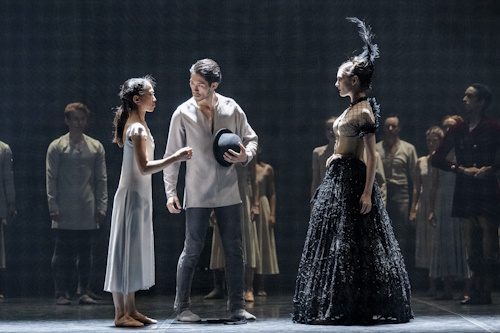
Photo Camilla Greenwell
Together, they gave a consummate lesson in acting and dancing, showing time and again how a single small gesture can carry so much weight. A married couple in real life, they really were an extraordinary partnership. They made you believe.
Hilarion is often very much relegated to a secondary role in classical productions of Giselle. But not here. Ken Saruhashi was immense, fully inhabiting his rather unpleasant character. He appears at first to be Giselle’s protector, although there’s later a strong suggestion that he does actually kills her on the orders of the chief Landlord after her affair with Albrecht is uncovered. Whatever, he’s certainly in the Landlords’ pay and very disingenuous. In his Act One dances, he exploded with energy.
As Myrtha, whose sole purpose in death appears to be revenge and punishment, Emma Hawes was perfectly hard, dominant and icily cold. And what presence. She was supported wonderfully by her army of dusty, battered but battle-hardened Wilis who look like they’ve just emerged from hell. As they dance with their long staves, the patterning is superb.
When Hilarion appears begging forgiveness, Giselle fights him off before the Wilis put him to death with those staves. Slowly. In the traditional Giselle, one usually feels some sympathy for him but nit here. He has everything coming to him that he gets.
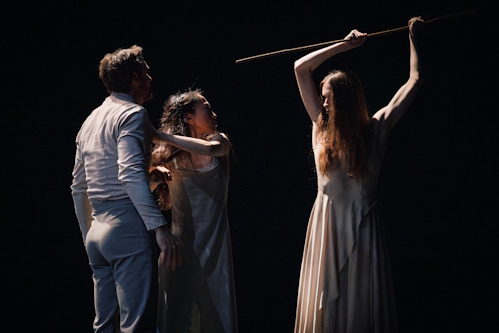
and Emma Hawes as Myrtha in Akram Khan’s Giselle
Photo Lee Chia-Yeh
When Albrecht appears, it’s very apparent how Myrtha, having first attempted to keep them apart, backs off, beaten by the strength of Giselle. But then, equally, she prowls in the background like a hunter animal waiting for the first sign of weakness, the first misstep, by her prey.
When the new day dawns, Myrtha and Giselle edge back toward their ghostly underworld, leaving Albrecht in agony. Again. Khan takes his time. There’s some sadness, but more than anything, anger as the injustice of it all wins.
Elsewhere, Khan’s choreography for the ensemble is superb, their dances throbbing and pulsing with energy. Some of the movement looks incredibly animalistic, the dancers charging across the stage, heads down, like stampeding animals. And when Albrecht is found out, it’s not just Giselle that loses it, the whole community of Outcasts seem equally afflicted by the pain.
Italian composer Vincenzo Lamagna’s score fits like a glove, hinting where it needs to at themes in Adam’s original, which weave their way in like ghostly echoes from the past. Adding white noise, drumming and humming to the orchestral sounds, it is ominous from the off. Frequent crescendos alternate with poignant silences that seem to magnify the emotions of the dancers.
Tim Yip’s set, that massive rotating wall, remains astonishing, although it’s not obvious that it represents the exterior of a closed factory, now occupied by the Outcasts who are migrant garment workers.
But Akram Khan’s Giselle remains a striking piece of dance and storytelling. A ballet where one lives the experience with the dancers. It draws you in. Ten years on, it still grabs you and doesn’t let go.


